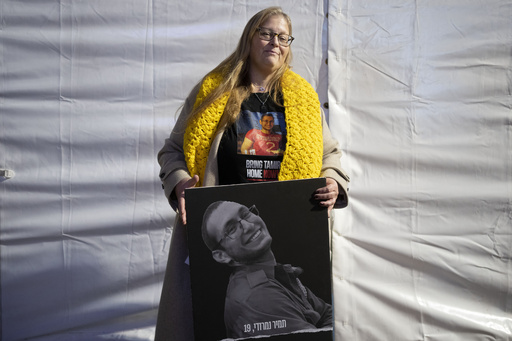
After 16 months filled with tormenting uncertainty, Idit Ohel was finally informed this week that her 24-year-old son, Alon Ohel, a hostage in Gaza, is still alive. Upon hearing the harrowing details of his captivity from other released hostages who shared the same fate since October 7, 2023, she fainted. Alon has endured his captivity bound by chains in an underground tunnel, surviving on a meager piece of bread or less each day. “He hasn’t seen sunlight in 493 days,” she recounted during a press conference on Monday.
As the tenuous ceasefire between Israel and Hamas faces mounting threats of collapse — with Hamas announcing that they will not release three hostages as scheduled, and Israel stating it is prepared to resume military actions if necessary — families of the remaining hostages are being pushed to the brink of despair. They are urging Prime Minister Benjamin Netanyahu to uphold the ceasefire arrangement and expedite the release timeline if at all possible. Concerns about the ceasefire deteriorating have intensified following demands from former President Donald Trump, who has insisted that all hostages be freed by Saturday and has proposed that Gaza be cleared of Palestinians and transformed into a U.S-hosted tourist zone.
The distressing state of three previously released hostages has left Israeli citizens furious and has sent families of those still being held into deeper despair, particularly as further details about the conditions of their confinement become known. The families of hostages not included on the list of 33 to be released in the initial six-week phase of the ceasefire, which began on January 19, are facing an especially agonizing situation. The agreement stipulates that Israel will release 2,000 Palestinian prisoners and detainees, whose families are also apprehensive about their treatment.
Two of the released hostages, Or Levy and Eli Sharabi, were held in captivity alongside Alon Ohel, who remains in an underground enclosure. The four had been abducted from a bomb shelter during a music festival, and their ordeal is echoed by many others in similar situations. One of the hostages, Eliya Cohen, is anticipated to be released in this initial stage of the ceasefire, while Alon would be released later, if further negotiations yield positive results.
Cohen’s fiancée, Ziv Abud, shared her heartbreak upon learning of the inhumane conditions he faced, reporting that he lost over 20 kilograms (44 pounds) and had a gunshot wound that lacked proper medical care. While in captivity, Cohen was not even aware that Abud survived the Hamas assault on the bomb shelter where they sought refuge during the attack, which resulted in the deaths of at least 16 people.
Families left waiting for news of their loved ones who are not included in the current release schedule are grappling with an especially heavy emotional burden. Negotiations for a subsequent phase of the ceasefire aimed at concluding the conflict and enabling the release of all remaining hostages were set to commence last week. However, these discussions were halted amid mutual accusations of non-compliance with the original ceasefire terms.
Tamir Nimrodi, a 20-year-old Israeli soldier kidnapped from a border crossing, is among those whose futures remain uncertain, as he is not among the hostages listed for the first phase of releases. His mother, Herut, expressed shock over Hamas’ intention to postpone future releases. “We try to analyze it, think, what are the possibilities? Is this psychological warfare they are waging against us?” she pondered.
The release of hostages during these past weeks has been particularly challenging for Nimrodi, who finds it hard to watch the emotional reunions depicted in video footage. Each reunion offers a glimmer of hope for her son’s return — he is a creative individual with a passion for horse riding and sweet pineapple cocktails. However, without any communication confirming his status, the uncertainty looms large, and she fears for his well-being knowing that two other soldiers abducted with him were killed.
Reports indicate that recently freed hostages have provided confirmation of life for at least seven Israeli hostages, including Cohen and Ohel. The unpredictability of the situation weighs heavily on Nimrodi, who struggles to decide what is more troubling — the idea that her son may no longer be alive, or the prospect that he is enduring conditions similar to those described by Alon Ohel. “I fear if Tamir is still alive, I can’t even begin to comprehend what he is experiencing,” she admitted.
Idit Ohel received news about her son’s circumstances shortly before appearing on an Israeli news program. Overcome with emotion, she begged the government to push forward into the second phase of the ceasefire to ensure a speedy return for all hostages. Alon, a gifted pianist who holds both German and Serbian citizenship, has had pianos placed across Israel in his honor, many painted yellow — a color signifying the struggle for hostages.
On Monday evening in Tel Aviv, the family commemorated Alon’s second birthday in captivity, where Idit passionately addressed the Israeli government. “After everything you’ve witnessed, after all the accounts you’ve heard from hostage survivors, how can you allow this situation to persist?” she questioned. Miraculously, Alon had sent a message to his younger sister, Inbar, who celebrated her birthday just days earlier, which was relayed through the released hostages. “She received her birthday wish to hear from her brother, which is truly incredible,” Idit said, tears streaming down her face.

